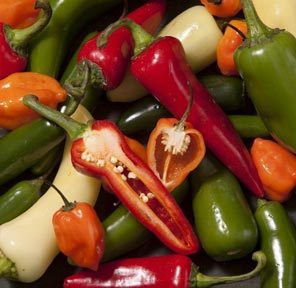Why You Should Be:
Grass seed farmers burned their fields to eliminate unwanted strains of grass from polluting their crops.
The heat cleared the agricultural canvas for a new crop of specific seeds, not what the wind blew in.
Chili peppers do the same thing. Before they developed their internal heat, peppers were just another snack for animals to forage on, for bugs to spread fungus in.
The heat developed over time. A Northwest study with research links in Bolivia shows how it happened.
Insects bored into a chili pepper and left a fungus that grew quickly and killed the fruit’s seeds. The plant was defenseless until it developed the spicy heat we know today. The heat killed the fungus and chilies thrived.
A survey in Bolivia showed peppers in areas with high insect populations were hotter than plants growing where few insects lived. The plants’ heat is determined by the amount of insects they need to protect against.
Do we receive the same benefit by including chili peppers in our diets?
Scientific evidence says yes. Capsaicinoids are the heat source in peppers that evolved to protect them from microbial attacks as well as animals. Humans may have used them for the same reason.
Researchers found mention of chilies for food and medicine 6250 years ago in Ecuador. They suggest peppers were introduced in regions with bland food. Modern drug testing has nothing on the ancients when those who ate chilies didn’t get sick from eating the same food as those who skipped the peppers.
As plants evolve, so does human knowledge. Capsaicin is now tested and used for pain management and skin diseases as well as pepper spray used for self-defense.
Are chili peppers a good choice for your diet?
If you’re not used to the heat, find mild peppers to acclimate yourself. The hotter the pepper, the more carotenoids and flavonoids they contain. These are anti-oxidants that fight cancer causing free radicals in our system. They are also what give certain fruits and vegetables their color.
The next time you talk to friends about the benefits of a plant-based diet, explain the link between anti-oxidants and cancer. Then invite them over for a delicious medley of peppers, yellow squash, carrots, broccoli and red cabbage to jump start their immune system.
They will thank you.


